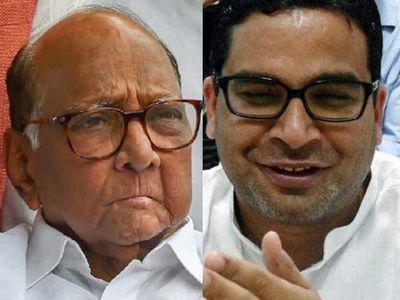Kolkata: Political strategist Prashant Kishor calling on Nationalist Congress Party (NCP) president Sharad Pawar at Pawar’s residence in Mumbai on Friday has set off much speculation, including that it was part of West Bengal Chief Minister Mamata Banerjee’s attempts to prepare the ground to form an anti-NDA alliance ahead of the 2024 general elections.
The meeting between Pawar and Kishor lasted for over three hours, triggering much speculation. In 2019, Mamata had taken the initiative to form an anti-NDA (National Democratic Alliance) alliance, but the exercise fell flat. This time, speculation is that Mamata Banerjee is trying to use Kishor’s skills to prepare the ground for a similar exercise.
After defeating the Bharatiya Janata Party in the recent Assembly polls, the Bengal Chief Minister has been in the forefront as an anti-Modi face. Mamata Banerjee has been challenging the Prime Minister on every issue, from the Covid pandemic situation in the country, the short supply in vaccines
After losing some vote share to the BJP in the 2019 Lok Sabha elections, the TMC supremo roped in Kishor for the recently concluded Assembly polls and got results, retaining Bengal for the third time with a thumping majority. In the process she has proved that the BJP can be challenged.
Kishor’s journey is largely remembered for the number of times he has jumped camps, from Punjab to West Bengal, from Uttar Pradesh to Andhra Pradesh and from Delhi to Tamil Nadu, making him a “power centre” in Indian politics in his own right.
In 2013, Kishor created the Citizens for Accountable Governance (CAG), a media and publicity company, as part of his campaign for Narendra Modi for the 2014 Lok Sabha elections. Before that, he had worked as Modi’s strategist in Gujarat in 2011. After Modi’s win in 2014, Kishor has worked as a strategist for the Congress, JDU, AAP, Shiv Sena, Trinamool Congress and DMK.
CAG was later converted into a specialist policy outfit, the Indian Political Action Committee (I-PAC). In 2018, Kishor had joined the JDU, but had a fall-out with Nitish Kumar over the Citizenship Amendment Act. In 2020, he was expelled from the party.
Kishor has delivered several impressive results—from Modi in 2014, the Mahagatbandhan in Bihar in 2015 to Amarinder Singh in 2017 and Jagan Reddy in 2019, and now Mamata Banerjee in 2021. Kishor does well when he is with the winning side. But when he had, for instance, Rahul Gandhi to convince voters with and to build a brand around, he simply couldn’t.
Kishor carefully chooses strong sides—Jagan, Mamata Banerjee, Kejriwal, DMK. This is precisely the astuteness that has kept him afloat.
More than selling the politician he is working with, Kishor knows how to sell himself.
However, in the 2017 Uttar Pradesh polls, not only did the BJP win without Kishor, it actually won against him. The poll strategist came on board for the Congress campaign, backing Sheila Dikshit as the Chief Minister. The results left the Congress-Samajwadi Party combine in a disaster. The biggest sufferer was the Congress.
In 2019, Mamata Banerjee met NCP chief Sharad Pawar and leaders of some regional parties as well as NDA ally Shiv Sena to explore a “federal front” option to take on the BJP in the next Lok Sabha polls, mooting a “one-to-one” fight in all the states. But the exercise fell flat, with the “Modi wave” decimating all.

